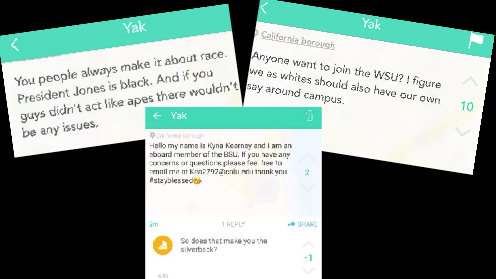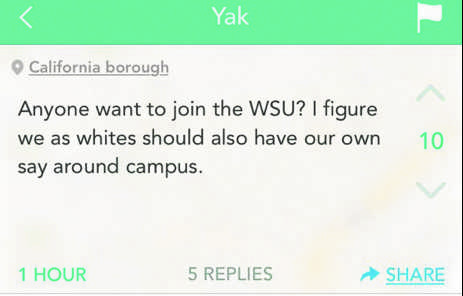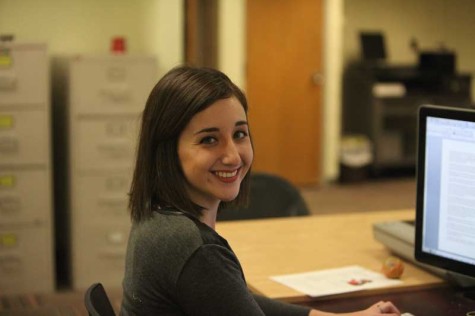Does Cal U discriminate?
Students feel that they are not treated equally by other students or administrators because of race

Racial tension came to the surface on sites like Twitter and apps like YikYak after members of the BSU spoke at the Campus Talk about their Homecoming party. According to several students, this isn’t the only time that they have dealt with racism or discrimination at Cal U.
After a number of students from California University of Pennsylvania’s Black Student Union reported feeling racially targeted during the Campus Talk on Nov. 6, students are wondering if everyone is treated equally at Cal U. Discrimination and racism were the topics of Interim President Geraldine Jones’s Campus Talk, and further discussion was generated from this campus talk.
Stetson Provance, the Cal Times news editor, explored the issue of the Black Student Union’s homecoming party on Oct.24 and the treatment of those in attendance by university officials in an article last month. But for several students, this is just one case of discrimination by the university, its students, or its officials.
The backlash on social media after the Campus Talk speaks to their experiences. Racist remarks were made on Twitter and YikYak. Comments made on YikYak referred to black students as “apes”, questioned the name of the Black Student Union, asked why there wasn’t a “white student union”, and referred to an E-board member of the Black Student Union as a “silverback gorilla” when she revealed her name, and her e-mail to try and direct concerns in a more personal manner.
Members of Cal U Women United created posters with the offensive comments on them, and posted them around campus to raise awareness of these issues. Hashtags like #BBCALU (being black at Cal U) resurfaced after periods of inactivity.
Cal U is a predominately white institution, or a PWI, where African-Americans are a part of the minority. According to the Cal U website, 11 percent of the student population is black. BSU’s existence as a minority group was also pu t in question by the yikyaks. However, any student is eligible to join this organization, not just African American students.
t in question by the yikyaks. However, any student is eligible to join this organization, not just African American students.
When asked about his experiences at Cal U, Rodney Edwards, vice president of the BSU, said the racist comments began from his white peers in his freshman year of fall 2009. He heard his friends experiencing the same type of treatment and indirect comments.
Fellow students would ask Edwards about the texture of his hair, and assume that he had been witness to violence in his hometown of Philadelphia.
“Because I am from such a diverse area, when I came to Cal U I didn’t expect it to happen. I didn’t expect it to continue. It was just shocking,” Edwards said.
Edwards says he feels racial tensions have increased at Cal U since he arrived as an undergraduate. Six years later, Edwards is now a graduate student. He helped to plan the BSU homecoming party this year.
“I am transitioning out of here and I am dealing with this more so from my administrators now and it is a bit disgusting,” Edwards said.
When the BSU executive board met with university officials after the Campus Talk to question the way the Homecoming party was handled, at least one official associated the BSU and black students in general with negatives stigmas, says Edwards.
While Edwards said he didn’t experience racism or discrimination on an academic level, he was quick to point out its presence in extracurricular events planned by the university. Events, such as Homecoming week, sponsored by Student Affairs and the Student Activity Board are geared towards one culture, Edwards said.
“I will continually say this, and I stand by this, Cal U has not done anything culturally for me,” Edwards said.
“Every student is invited to get involved with the Student Activities Board, which plans campus activities,” said University Spokesperson Chris Kindl, after she was presented with Edwards’s feelings about events on campus.
Edwards also said that he feels a lack of support from white peers, and that often they just turn their shoulder to any issues of racism or discrimination.
Edwards, a graduate of Lincoln High Upward Bound Program that sends a bulk of their students to Cal U, said he will not hesitate to contact the director of the program and tell them to stop recommending Cal U to students.
Another student, Jerron Corley, says he has experienced much of the same. Corley is a sophomore, and is also on the E-board for BSU. He feels that his experiences are very similar to other black students at Cal U, and that he can speak for many of them on the topic.
Corley has also experienced what he calls discrimination since first coming to Cal U, especially in the form of microagressions.
“I’m with a group of friends, and a group of individuals are walking towards our way. At a certain point they are completely silent. They stop conversing and wait till they pass us to start again,” Corley said. “It is these little things that make me question the reasoning behind the level of discomfort that comes with our presence as a whole.”
These microaggressions are often subconscious or indirect comments that have a negative connotation.
“I’ve heard people say to me here, ‘you sound so educated.’ In order for me to be labeled as black, would I have to speak in slang?” Corley said.
Corley said he knew this area in Pennsylvania would be different from his hometown of Philadelphia, but didn’t want to believe he would continually experience racism at Cal U.
Corley pointed out discrimination did not come from his professors and that he did not experience it from administrators until BSU planned the Homecoming party. Both Edwards and Corley said they felt administration had handled their party differently than events held by other organizations on campus.
When the BSU E-board filled paperwork to reserve the Performance Center for the party, there was no capacity limit listed. Several days before the event, the BSU E-board received notice there would only be 300 people permitted to attend the party. At the time of this notice, Edwards had already collected more than 300 names for the guest list alone which included Cal U alumni, friends and family of current Cal U students.
While the BSU E-board was told that there would be three university police officers present, seven officers and the police dog showed up, Edwards said.
All of the lights in the Performance Center had to stay on despite it being a party, according to Edwards.
In a previous interview with Police Chief Ed McSheffery, McSheffery said that the limited number of wristbands given out for entry and the number of police at the party wasn’t out of the norm for Homecoming weekend.
These inconsistencies in the planning of the party, like the number of people who were permitted to attend, came from administrators like Student Affairs Vice President Nancy Pinardi, Edwards said. In meeting with students from the BSU after the party, Edwards said Provost of Academic Affairs Bruce Barnhart and Interim President Geraldine Jones gave varying explanations for the way students were handled at the party and in the way the party was planned.
“If it wasn’t discrimination or racism, then it still wasn’t policy,” Edwards said. Edwards also felt he had to work much harder than he should have to get university officials to take BSU’s concerns about the issue of racism seriously.
Corley said it felt like administrators didn’t want to deal with the issue, and wanted to get rid of it as soon as possible.
Both Pinardi and Barnhart denied an interview with the Cal Times for this article, and instead directed questions to university spokesperson Chris Kindl.
Corley and Edwards said they had considered transferring from Cal U because of the issues they have experienced here.
“I do feel forced to be here due to the fact that I am here on scholarship. ” Corley said.
“In these areas (and many more), students who want to see greater diversity in student leadership or campus activities can work toward change by participating in a positive fashion,” Kindl said in an e-mail interview.
When surveys were being conducted and open sessions were being held for the presidential search, Corley attended to voice his opinions, and encouraged his black peers to do the same thing.
“I honestly feel like President Jones is not supporting the black community,” said Corley.
The microaggressions and racial epithets Corley and Edwards said they have experienced on campus can not only cause mental and emotional issues while they are a college student, but also after they graduate, according to Rueben Brock, a psychology professor at Cal U who studies issues of race. Edwards and Corley’s experiences echo the experiences that many other students of the minority are dealing with.
“The research is pretty clear on microaggressions being a real source of anxiety and leading to concrete physical and emotional stress,” Brock said. “This comes both from always feeling like you are being attacked and feeling like you are paranoid, too. You think, ‘wait was that an insult, or was that sincere?’”
These microaggressions that might be coming from other students or administrators are largely unintended, according to Brock.
“When a person says to me ‘wow, you are so articulate’ they don’t mean to say ‘you are articulate for a black man’. They think it is a compliment,” Brock said.
However, Brock says his experiences as a professional at Cal U are different from what the students are experiencing as undergraduates and graduates.
“My experience at Cal U has been really, really good, and I think a part of that is because there is a segment of the population—at least on the professional level–that really do want to see change here,” Brock said.
However, when Brock first began teaching at Cal U he noticed black students flocked to him and came to him for support that they were not getting elsewhere. They felt they needed him here, he said.
“Racism is emotionally taxing on a person. It makes you work hard mentally and emotionally to get through the day,” Brock said. “It creates these hurdles for people that others don’t have to experience.”
Brock suggests a student who is experiencing racism find a network of people he or she can talk to so they don’t have to bear the brunt of it alone.
“People need to check their biases and to recognize that the way that they think about certain people permeates their attitude, their behavior and their speech,” Brock said.
John Burnett, of the Social Equity office at Cal U, said that when most students are looking at whether or not Cal U is diverse, they are looking at race and ethnicity instead of nationality, culture, political thought, and religious belief.
“I believe we do have a diverse student body and a diverse faculty in some ways,” Burnett said.
The Social Equity Office has several ongoing diversity initiatives with Student Affairs, the End V Center, and the Fredrick Douglass Institute.
While there is a diversity plan in place for new hires through the university, minority doctorate graduate students are highly sought after by all universities. While Cal U has a national search for its open doctoral positions, often times other universities are able to pay them more, Burnett said.
Students who are experiencing discrimination by students, faculty, or administrators can report it to the Office of Social Equity. Depending on the severity, the repercussions range from non-contact orders to expulsion or termination from Cal U. There is currently an active complaint about BSU’s Homecoming party and how it was handled by the university.
“When people are being overtly rude and abusing their power–that is when we need to know. We want people to have a quality experience here,” Burnett said.
Another active complaint was issued after the shooting reported near Vulcan Village on Nov. 17. In this case, the shooter was identified as black and was later found to be white, leading students to believe that racial profiling played a part in the original description.
Three days after the incident, Interim President Jones ‘s office sent out an e-mail notifying students that the physical description of the shooting suspect was given by a witness to a California Borough Police Officer, who then shared the details with the university. Under the Clery Act, as soon as the university has any information, they are required to send it out.
This year there have been 180 reports of discrimination at Cal U, which is more than last year. According to the Equal Employment Opportunity Commission, only 10 percent of reports show discrimination of any type.
“Cal U is committed to diversity and inclusiveness,” Kindl added. “This commitment can be seen in the initiatives taken by the Office of Social Equity.”
“I’d be foolish or naïve to suggest that there is not racism here,” Brock said. “[But] I don’t think there is any more or less racism here than any other place I have seen. I think that the size of the university makes it feel more pronounced. If something happens, you are going to know about it.”

Lauren Griffith has been involved with the Cal Times for three years, and staff for two years. She is also involved in Society of Professional Journalists,...
